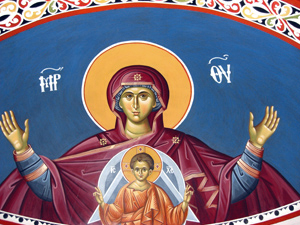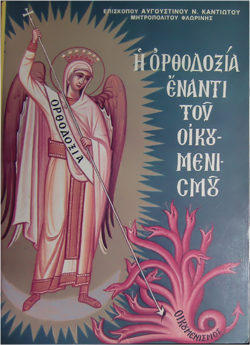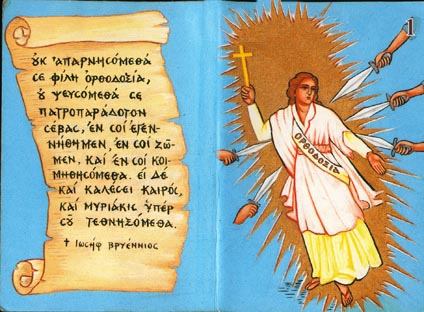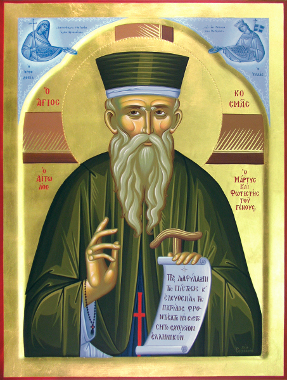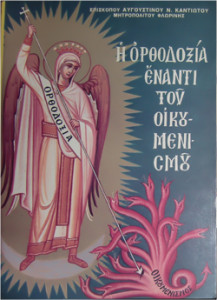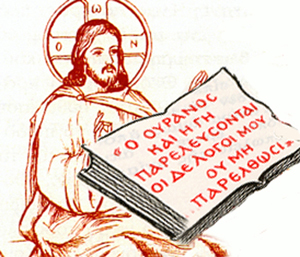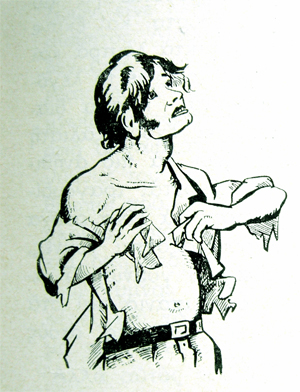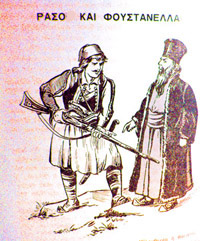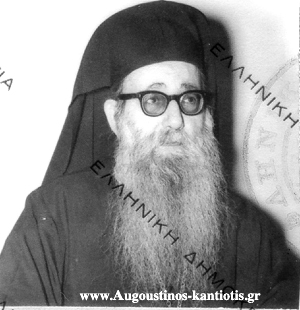ΕΛΛΗΝΙΚΑ, ΑΓΓΛΙΚΑ ΚΑΙ ΓΕΡΜΑΝΙΚΑ
ΑΥΓΟΥΣΤΙΝΟΣ Ν. ΚΑΝΤΙΟΤΗΣ
Επίσκοπος Φλώρινας, Ελλάδας
Augustinus Kantiotis
Bischof von Florina
ΠΑΡΗΓΟΡΗΤΙΚΗ ΕΠΙΣΤΟΛΗ ΠΡΟΣ ΠΕΝΘΟΥΝΤΑΣ
TROSTBRIEF AN TRAUERNDE
Institut für Byzantinische und Moderne griechische Studien
115 Gilbert-Strasse
Belmont, Massachusetts 02178
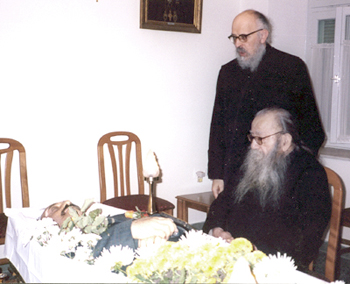 Αγαπητέ άναγνώστα,
Αγαπητέ άναγνώστα,
Ή επιστολή πού ακολουθεί έγράφη από τον σεβασμιώτατον Μητροπολίτην Φλωρίνης Αύγουστίνον Ν. Καντιώτην, γνωστόν διαπρεπή Ιεροκήρυκα και μεγάλον έκκλησιαστικόν άνδρα της Έκκλησίας της Ελλάδος. Ό σεβαστός πατήρ και διδάσκαλος της συγχρόνου ‘Ορθοδόξου Έκκλησίας μας συνηθίζει να άποστέλη την έπιστολήν αυτήν εις τα πενθούντα πνευματικά τέκνα της Μητροπόλεως του, όταν χάσουν κάποιο προσφιλές πρόσωπον της οικογενείας των, επιθυμών δι’ αυτής να έλαφρύνη τον πόνον των και ενίσχυση την πίστιν και την ελπίδα των εις τον Σωτήρα Χριστόν, τονίζων ότι ό Κύριος μας δια του θανάτου και της αναστάσεως Του βεβαιώνει ότι οι κεκοιμημένοι αδελφοί μας δεν άπέθανον άλλα ζουν και ότι και ημείς μετά την άναχώρησίν μας εκ του κόσμου τούτου θα τους συναντήσωμεν και ότι θα άναστηθώμεν ως κι’ Εκείνος και ότι θα καταστώμεν μέτοχοι της αιωνίου ζωής και βασιλείας Του.
Ή παρούσα έκδοσις της επιστολής είς την Έλληνικήν και Γερμανικήν γλώσσαν έχει τον αυτόν σκοπόν, ήτοι την διαβεβαίωσιν ότι ό Ιησούς Χριστός, ό άναστάς εκ νεκρών και βασιλεύων είς τους αιώνας, είναι ό εξουσιαστής της ζωής και του θανάτου, ότι ή ζωή μας πρέπει να είναι ζωή πίστεως, ελπίδος και αγάπης είς Αυτόν, και ότι θα πρέπη να ζώμεν βίον σύμφωνον προς τάς έπιταγάς του Ιερού Ευαγγελίου Του.
Με την μελέτην της επιστολής αυτής οί καλοπροαίρετοι άναγνώσται θα δυνηθούν, εάν τυγχάνη να πενθούν δια προσφιλές των πρόσωπον, να ελαφρύνουν τον πόνον των, να ελευθερωθούν εκ του φόβου του θανάτου, να ενισχυθούν είς την πνευματικήν των ζωή ν, να αγαπήσουν τον Κύριον και την Έκκλησίαν Του, ή δε ζωή των θα λαβή έννοιαν, σκοπόν και κατεύθυνσιν. Το εύχόμεθα από καρδίας. Πατήρ Άστέριος Γεροστέργιος
Lieber Leser,
Der folgende Brief wurde von dem hochwürdigen Metroplit Florinas, Augustinus N. Kandiotis, geschrieben, dem bekannten hoch gewürdigten Prediger und großen Kirchenmann der Kirche Griechenlands. Der hoch geschätzte Vater und Lehrer unserer modernen Orthodoxen Kirche verschickt gewöhnlich diesen Brief an die trauernden geistigen Kinder seiner Metropole, wenn sie ein geliebtes Mitglied ihrer Familie verlieren. Er will ihnen dadurch den Schmerz erträglicher machen und ihren Glauben und ihre Hoffnung auf Jesus Christus stärken. Er will ihnen versichern, dass unser Herr durch seinen Tod und seine Auferstehung uns beweist, dass unsere verschiedenen Brüder und Schwestern nicht gestorben sind, sondern leben und dass wir sie auch nach unserem Ableben wieder sehen werden, und wir werden auferstehen wie Er und wir werden als Mitglieder des ewigen Lebens und Seines Königreichs eingesetzt werden.
Die vorliegende Ausgabe des Briefes in griechischer und deutscher Sprache hat den Zweck zu versichern, Jesus Christus, auferstanden von den Toten und herrschend in alle Ewigkeit, ist der Herrscher über Leben und Tod. Unser Leben muss ein Leben im Glauben, in der Hoffnung und in Liebe für Ihn sein und wir müssen ein Leben nach den Geboten seines Heiligen Evangeliums führen.
Durch das Studium dieses Briefes werden die gläubigen Leser getröstet, wenn sie um einen geliebten Angehörigen trauern, ihr Schmerz wird gelindert, sie werden von der Angst vor dem Tod befreit, ihr geistiges Leben wird bereichert, sie werden den Herrn und seine Kirche lieben und ihr Leben wird Sinn, Ziel und Richtung bekommen. Das wünsche ich allen von ganzem Herzen.
Pater Asterios Gerosterios
ΠΑΡΗΓΟΡΗΤΙΚΗ ΕΠΙΣΤΟΛΗ ΠΡΟΣ ΠΕΝΘΟΥΝΤΑΣ
TROSTBRIEF AN TRAUERNDE
Αγαπητοί μου,
Σήμερον ένα πρόσωπον της οικογενείας σας άνεχώρησεν από τον μάταιον τούτον κόσμον. Έζησε μαζί σας ένα χρονικόν διάστημα. Έζήσατε μαζί αλησμόνητους ημέρας χαράς, άλλα και θλίψεως. Θα ήθέλατε να ζήση περισσότερον. ‘Αλλά και χίλια χρόνια εάν κατώρθωνε να ζήση επί της γης ό άνθρωπος, ωσάν μία ήμερα θα τω έφαίνετο. Ό χρόνος φεύγει ταχέως. Ό θάνατος έρχεται. Είνε αναπόφευκτος. Τίς ζήσεται και ουκ όψεται θάνατον; Ήλθε, λοιπόν, ό θάνατος και ήρπασεν από την άγκάλην της αγάπης σας το προσφιλές σας πρόσωπον. Εις τους τάφους της οικογενείας σας ένας νέος τάφος προσετέθη. Και επάνω εις τον τάφον τώρα σείς κλαίετε. Ό άνθρωπος, τον όποιον ήγαπήσατε, δεν υπάρχει πλέον.
Τί είπον; Δεν υπάρχει πλέον; Όχι. Αυτό δεν είνε αληθές. Ό άνθρωπος σας, τον όποιον σήμερον με τάς εύχάς της Εκκλησίας έκηδεύσατε και έθέσατε εις τάφον, ΥΠΑΡΧΕΙ. Πώς; ‘Αρχαίος φιλόσοφος της Ελλάδος, ό μεγαλύτερος φιλόσοφος, ό Σωκράτης, ολίγον πριν άποθάνη συνέστησεν εις τους Ιδικούς του να μη θρηνούν δια τον θάνατον του, καί να μη πολυσκοτίζωνται πού και πώς θα τον θάψουν. Διότι αυτό πού θα θάψουν δεν έίνε ό Σωκράτης. Είνε το σώμα του. Ό Σωκράτης, είπεν, είνε ή ψυχή, ή οποία δεν αποθνήσκει ποτέ. Ή αθάνατος ψυχή κατά την ώραν του θανάτου φεύγει, όπως φεύγει το φυλακισμένο πουλί όταν άνοιξη το κλωβί. Ό Σωκράτης, πού σεις κλαίετε και θρηνείτε, έχει αυτήν την στιγμήν χαράν, διότι φεύγει από τον κόσμον αυτόν της αδικίας και μεταβαίνει είς ένα άλλον κόσμον, οπού δικαιοσύνη επικρατεί. Το δίκαιον, πού έχασα εδώ είς την γήν, θα το εύρω εις τους ουρανούς …
Meine Lieben,
Heute ist ein Mitglied eurer Familie aus dieser vergänglichen Welt geschieden. Es hat Jahre mit euch gelebt. Ihr habt unvergessliche Tage der Freude, aber auch der Trauer erlebt. Ihr habt euch gewünscht, es würde noch länger leben. Aber auch wenn der Mensch tausend Jahre in dieser Welt leben würde, es wäre doch wie ein Tag. Die Zeit vergeht im Fluge. Der Tod kommt. Er ist unvermeidlich. Wer lebt und stirbt nicht? Jetzt ist der Tag gekommen und hat euch aus den Armen der Liebe den geliebten Menschen genommen. Den Grabstätten der Familie wurde eine neue Grabstätte hinzugefügt. Und an diesem Grab weint ihr jetzt. Den Menschen, den ihr geliebt habt, gibt es nicht mehr.
Was sage ich da? Es gibt ihn nicht mehr? Nein! Das ist nicht wahr. Den Menschen, den ihr heute mit dem Segen der Kirche begraben habt, gibt es! Wie? Ein alter griechischer Philosoph, der größte Philosoph, Sokrates, befahl kurz vor seinem Tod den Seinen, nicht um seinen Tod zu trauern und sich keine großen Gedanken zu machen, wie und wo sie ihn begraben werden. Denn das, was sie begraben, sei nicht Sokrates. Das sei sein Leib. Sokrates, so sprach er, ist die Seele, die nicht stirbt. Die unsterbliche Seele weicht im Augenblick des Todes wie ein Vogel aus einem geöffneten Käfig. Sokrates, um den ihr weint und trauert, erlebt jetzt eine große Freude, denn er geht aus dieser Welt des Unrechts und tritt in eine andere Welt ein, wo Recht herrscht. Das Recht, das ich auf Erden verlor, werde ich im Himmel finden……
Τοιαύτα λόγια είπεν ό φιλόσοφος εκείνος ολίγας στιγμάς πριν άποθάνη. Ό Σωκράτης, αν και έζησε 400 έτη προ Χρίστου, έπίστευεν όμως εις την άθανασίαν της ψυχής και με θάρρος άντίκρυσε τον θάνατον και παρηγόρησε τους ιδικούς του.
Ημείς δε, οί όποίοι ζώμεν μετά Χριστόν, εάν δεν πιστεύωμεν, ότι ή ψυχή έίνε αθάνατος, και ότι πέραν του τάφου υπάρχει μία άλλη ζωή, είμεθα τελείως αδικαιολόγητοι δια την άπιστίαν μας. Διότι όχι φιλόσοφος, ό όποιος ως άνθρωπος ημπορεί να πλανηθή, άλλ’ αυτός ό θεός, ό όποιος έγινεν άνθρωπος, ό θεάνθρωπος, ό Κύριος ημών Ήησούς Χριστός, ή Πηγή της αληθείας, ή Αλήθεια, ή Αύτοαλήθεια, μας έβεβαίωσε περί αυτών των πραγμάτων. Έκήρυξε κατά τον πλέον κατηγορηματικόν .τρόπον, ότι ό άνθρωπος έχει ψυχήν άθάνατον. «Τί ωφελήσει άνθρωπον είπεν εάν κερδήση τον κόσμον όλον και ζημιωθή την ψυχήν αυτού; ‘Ή τί δώσει άνθρωπος αντάλλαγμα της ψυχής αυτού;» (Μάρκ. 8.36-37). Και όχι μόνον έκήρυξε την άθανασίαν της ψυχής, αλλά και με θαύματα έβεβαίωσε την θεμελιώδη αυτήν άλήθειαν. Ό Χριστός άνέστησε νεκρούς. Άνέστησε την κόρην του Ίαείρου, τον υίόν της χήρας της Ναίν και τον Λάζαρον. Ή άνάστασις του Λαζάρου περιγράφεται λεπτομερώς είς το ένδέκατον κεφάλαιον του κατά Ίωάννην Ευαγγελίου και παρακαλώ, μόλις έπισρέψητε από την κηδείαν του προσφιλούς σας προσώπου, ν’ ανοίξετε το Εύαγγέλιον καί να μελετήσετε το κεφάλαιον τούτο. Να το μελετήσετε δε όχι μίαν φοράν, αλλά πολλάκις. Δεν υπάρχουν πλέον παρήγορα λόγια από τα λόγια του Ευαγγελίου. Ότι συνέβη εις τον Λάζαρον θα συμβή και είς κάθε άλλον άνθρωπον. Ό Κύριος, ό όποιος άνέστησε τον Λάζαρον εκ νεκρών, θ’ άναστήση και πάντα άλλον νεκρόν. Ή φωνή του Κυρίου «Λάζαρε, δεύρο έξω!», ή φωνή αυτή ή παντοδύναμος, ή οποία έκαμε να έπανέλθη ή ψυχή είς το νεκρόν σώμα και ό Λάζαρος να έξέλθη από τον τάφον, ή Ιδία φωνή θα άκουσθη και δι’ όλους τους νεκρούς. Εις όλους τους τάφους θα άκουσθη ή φωνή: «Νεκροί, εξέλθετε εκ των τάφων σας!» Και αϊ ψυχαί θα επανέλθουν εις τα νεκρά σώματα και οι άνθρωποι θα παρουσιασθούν και πάλιν, όχι πλέον με τα σημερινά σώματα, σώματα τα όποια υπόκεινται εις φθοράν ασθενείας καί θάνατον, αλλά με σώματα άφθαρτα. Δεν δυνάμεθα να φαντασθώμεν οποίος θα εινε ό άνθρωπος όταν ούτος άναστηθή εκ νεκρών.
Diese Worte sprach jener Philosoph wenige Augenblicke vor seinem Tod. Sokrates glaubte, obwohl er 400 Jahre v.Ch lebte, an die Unsterblichkeit der Seele und trat dem Tod mutig entgegen und tröstete die Seinen.
Wir aber, die wir nach Christus leben, wenn wir nicht glauben, dass die Seele unsterblich ist, dass es nach dem Grab ein anderes Leben gibt, sind ganz und gar verdammt durch unsere Ungläubigkeit. Denn nicht ein Philosoph, der als Mensch verblendet sein kann, sondern Gott, der Mensch geworden ist, der Gottmensch, unser Herr Jesus Christus, die Quelle der Wahrheit, die Wahrheit selbst, verkündet uns das. Er verkündigt auf die eindringlichste Art, dass des Menschen Seele unsterblich ist. Was hülfe es dem Menschen, wenn er die ganze Welt gewönne und nähme an seiner Seele Schaden? Denn was kann der Mensch geben, damit er seine Seele löse? (Markus 8.36-37). Und er predigte nicht nur die Unsterblichkeit der Seele, sondern er festigte mit Wundern diese grundlegende Wahrheit. Christus hat Tote auferweckt. Er hat die Tochter des Jairus, den Sohn der Witwe Nain und Lazarus auferweckt. Die Auferstehung des Lazarus wird im 11. Kapitel des Johannes-Evangeliums ausführlich beschrieben, und ich bitte euch, wenn ihr von der Beerdigung eures lieben Menschen zurückkommt, öffnet das Evangelium und lest dieses Kapitel. Ihr sollt es nicht nur einmal, sondern mehrmals lesen. Es gibt keine tröstlicheren Worte als die Worte des Evangeliums. Was mit Lazarus geschah, wird auch mit jedem anderen Menschen geschehen. Der Herr, der Lazarus von den Toten auferweckt hat, wird auch jeden anderen Toten auferwecken. Die Stimme des Herrn: “Lazarus, komm heraus!“ , diese allmächtige Stimme, die die Seele in den toten Körper zurückbrachte und die Lazarus aus dem Grab herausführte, dieselbe Stimme werden alle Toten hören. In allen Gräbern wird die Stimme ertönen: „Tote, kommt aus euren Gräbern heraus!“ Und die Seelen werden in die toten Leiber zurückkehren und die Menschen werden wieder erscheinen, nicht mit den Körpern, wie wir sie heute haben, mit Körpern, die Krankheiten und Tod ausgesetzt sind, sondern mit unverwundbaren Körpern. Wir haben nicht genug Fantasie um uns vorzustellen, wie der Mensch sein wird, wenn er von den Toten auferstehen wird.
Άλλ’ ή μεγαλύτερα άπόδειξις, ότι ό άνθρωπος θ’ άναστηθή, και ότι αυτός, ό όποιος πιστεύει και ζή συμφώνως προς το θέλημα του Θεού, όχι απλώς θ’ άναστηθή, αλλά θα ζήση μίαν ζωήν άφαντάστως ώραίαν και ευτυχή, ή μεγαλύτερα, λέγομεν, άπόδειξις της αναστάσεως των νεκρών και της μελλούσης ζωής είνε ή Άνάστασις του Κυρίου ημών Ιησού Χρίστου. Ναι! Άς λέγουν ότι θέλουν οι ύλισταί. και οι άπιστοι. Είνε αλήθεια, εινε γεγονός, το μέγιστον γεγονός της’ Ιστορίας του κόσμου, ότι ό Χριστός ένίκησε τον θάνατον. Ανέστη εκ νεκρών! Και όπως κηρύσσει ό κορυφαίος των Αποστόλων, «ό Χριστός άναστάς εκ των νεκρών έγένετο ή απαρχή των κεκοιμημένων» (Α’ Κορ. 15.20). Όπως ό Χριστός ανέστη, έτσι θ’ αναστηθούν και όλοι οι νεκροί. Αύτη εινε ή πίστις μας, το θεμέλιον της πίστεως μας.
Όταν οι άνθρωποι έπίστευον, δεν έθεώρουν τον θάνατον ως συμφοράν πού έπρεπε να τους βύθιση είς μίαν διαρκή λύπην, μελαγχολίαν και άπελπισίαν. Έκλαιαν βεβαίως και οι πιστοί δια τον θάνατον του προσφιλούς των προσώπου, αλλά δεν έκλαιαν όπως οι εθνικοί, είδωλολάτραι και άπιστοι. Ή ήμερα του θανάτου ενός χριστιανού, ενός ό όποιος έζησε και έμαρτύρησεν υπέρ Χρίστου, έωρτάζετο ως ήμερα γενέθλιος. Διότι δύο φοράς γεννάται ό άνθρωπος. Μίαν φοράν γεννάται όταν εξέρχεται από το σκότος της κοιλίας της μητρός του και άντικρύζη το γλυκύ του ηλίου φως, και δευτέραν φοράν γεννάται όταν εξέρχεται από το σκότος της παρούσης ζωής, πού ομοιάζει με την κοιλίαν της μητρός, και άντικρύζη το γλυκύ της αιωνιότητας φως. Ό άνθρωπος, όστις εξέρχεται από την κοιλίαν της μητρός του, δεν ζημιώνεται. Κερδίζει μίαν νέον ζωήν απείρως άνωτέραν εκείνης πού έζη είς την κοιλίαν της μητρός του. Άλλα και ό άνθρωπος, ό όποιος δια του θανάτου εξέρχεται από τον κόσμον αυτόν, δεν ζημιώνεται, άλλα κερδίζει μίαν νέαν ζωην απείρως ώραιοτέραν της παρούσης ζωής. Ό θάνατος κατά την χριστιανικήν πίστιν είνα κέρδος και όχι ζημία και συμφορά (Φιλιπ. 1.21). Αυτά έπίστευον οι χριστιανοί των πρώτων αιώνων και δι’ αυτό την ήμέραν του θανάτου ενός πιστού έώρταζον ως ήμέραν γενέθλιον, έψαλλον ύμνους Αναστάσεως και έλεγον δια τον έκδημήσαντα «Μακαριά ή οδός ή πορεύει σήμερον, ότι ήτοιμάσθη σοι τόπος αναπαύσεως».
Aber der größte Beweis dafür, dass der Mensch auferstehen wird und dass der, der glaubt und nach dem Willen Gottes lebt, nicht nur aufersteht, sondern ein unvorstellbar schönes und glückliches Leben führen wird, der größte Beweis, sage ich euch, für die Auferstehung von den Toten und das ewige Leben ist die Auferstehung unseres Herrn Jesus Christus. Ja! Sollen doch die Materialisten und die Ungläubigen sagen, was sie wollen! Es ist wahr, Wirklichkeit, das größte Ereignis der Weltgeschichte, dass Christus den Tod besiegte. Er ist von den Toten auferstanden! Und wie der erste der Apostel predigte: „Nun aber ist Christus auferstanden von den Toten und der Erstling geworden unter denen, die da schlafen.“ (1.Korinther 15.20). Wie Christus auferstanden ist, so werden alle Toten auferstehen. Das ist unser Glaube, der Grundstein unseres Glaubens.
Glauben die Menschen, so erleben sie den Tod nicht als Unglück, das sie in ständige Trauer, Melancholie und Verzweiflung stürzt. Natürlich weinen auch die Gläubigen über den Tod ihrer Lieben, aber sie weinen nicht wie die Götzenanbeter und Ungläubigen. Der Todestag eines Christen, eines, der für Christus lebte und zeugte, wird als Geburtstag gefeiert. Denn zweimal wird der Mensch geboren. Einmal, wenn er aus dem Dunkel des Mutterleibs tritt und das süße Licht der Sonne erblickt und das zweite Mal, wenn er aus dem Dunkel des irdischen Lebens tritt, das dem Mutterleib gleicht und das süße Licht der Ewigkeit erblickt. Der Mensch, der aus dem Mutterleib austritt, verliert nichts. Er gewinnt ein neues Leben, unvergleichbar höher als jenes im Mutterleib. Ebenso verliert der Mensch, der durch seinen Tod aus dieser Welt scheidet, nichts, sondern er gewinnt ein neues Leben, unvergleichbar schöner als das irdische Leben. Der Tod ist nach dem christlichen Glauben ein Gewinn und kein Schaden oder Unglück (Philipper 1.21). Das glaubten die Christen der ersten Jahrhunderte und deshalb feierten sie den Todestag eines Gläubigen als Geburtstag. Sie sangen Auferstehungslieder und sprachen zu dem Reisenden: „Gesegnet sei dein Weg, den du heute gehst, denn dein Ruheplatz ist bereitet.“ Aber wo ist heute dieser Glaube? Wehe! Heute herrscht der Unglaube.
Άλλα που σήμερον ή πίστις αυτή; Άλλοίμονον! Σήμερον ή απιστία επικρατεί. Σήμερον οί άνθρωποι, οί περισσότεροι των ανθρώπων, δεν πιστεύουν εις τον Κύριον, όστις έσταυρώθη και ανέστη υπέρ ημών και άνελήφθη εις τους ουρανούς και πάλιν θα έλθη, ίνα κρίνη ζώντας καί νεκρούς. Δεν πιστεύουν είς την άθανασίαν της ψυχής. Ζουν χωρίς πίστιν. Αποθνήσκουν χωρίς πίστιν. Και δι αυτό ό θάνατος τους τρομοκρατεί. Κλαίουν και θρηνούν τον συγγενή των πού άπέθανεν, ωσάν να μη ύπάρχη πλέον. Και όταν κάποιος τους όμιλήση δι’ άθανασίαν ψυχής, δι’ άνάστασιν νεκρών, δια μέλλουσαν ζωην, γελούν καί εμπαίζουν είς βάρος του. Και δια να πιστεύσουν, λέγουν, θέλουν αποδείξεις, θέλουν θαύματα.
θέλουν θαύματα και αποδείξεις! Άλλα θαύματα και αποδείξεις περί αναστάσεως νεκρών δεν υπάρχουν μόνον εις την Άγίαν Γραφήν, άλλα και είς ένα άλλο βιβλίον, το όποιον έγραψεν ό Πάνσοφος και Παντοδύναμος θεός. Το έγραψε δια να το διαβάζουν και να διδάσκωνται και οί πλέον αγράμματοι. Και το βιβλίον αυτό είνε ή φύσις. Καί είς το βιβλίον αυτό εύρίσκομεν ωραίας εικόνας της Αναστάσεως.
Ιδού ό ήλιος. Εάν κανείς δια πρώτην φοράν έβλεπε τον ήλιον να δύη και να χάνεται από τον ορίζοντα και το σκότος της νυκτός να εξαπλώνεται εις την γήν, θα έθρήνει και θα έλεγεν Ό ήλιος άπέθανεν! . . . Δεν θα έπίστευεν εις εκείνον, ό όποιος θα τον διεβεβαίωνεν ότι ό ήλιος και πάλιν θ’ άνατείλη. ‘Ο ήλιος φαίνεται να σβήνη κάθε βράδυ, άλλα δεν σβήνει. Είς άλλον κόσμον ανατέλλει και σκορπίζει το γλυκύ του φως. Ή ανατολή και ή δύσις του ηλίου είνε μία είκών της ζωής και του θανάτου. Όπως λέγει ό ποιητής, «ότι θεωρούμε βασίλεμα, γλυκοχάραγμα αυγής εινε πέρα, και αντί νάρθη μια νύχτ’ αξημέρωτη, ξημερώνει μι’ άβράδυαστη μέρα».
Heute glauben die Menschen, die meisten Menschen, nicht an den Herrn, der gekreuzigt wurde und auferstanden ist für uns, der aufgefahren ist gen Himmel und wiederkommen wird zu richten die Lebendigen und die Toten. Sie glauben nicht an die Unsterblichkeit der Seele. Sie leben ohne Glauben und sie sterben ohne Glauben. Deshalb fürchten sie sich vor dem Tod. Sie weinen und trauern um den Lieben, der gestorben ist und nicht mehr existiert. Und wenn einer zu ihnen spricht über die Unsterblichkeit der Seele, über die Auferstehung von den Toten, über das Leben nach dem Tod, so lachen sie ihn aus. Und sie sagen, um zu glauben wollen sie Beweise, wollen sie Wunder.
Sie wollen Wunder und Beweise! Aber Wunder und Beweise für die Auferstehung der Toten gibt es nicht nur in der Heiligen Schrift, sondern auch in einem anderen Buch, das der allwissende und allmächtige Gott geschrieben hat. Das hat er geschrieben, damit sogar die Ungebildetsten es lesen und daraus lernen. Und dieses Buch ist die Natur. Und in diesem Buch finden wir herrliche Bilder der Auferstehung.
Studiert die Sonne! Sieht jemand zum ersten Mal die Sonne versinken und am Horizont verschwinden und das Dunkel der Nacht sich über die Erde legen, wird er schreien und weinen: „Die Sonne ist gestorben!“…. Er wird jenem nicht glauben, der ihm versichert, dass die Sonne wieder aufgehen wird. Die Sonne scheint jeden Abend zu verlöschen, aber sie verlöscht nicht. In einer anderen Welt geht sie auf und verströmt ihr süßes Licht. Der Sonnenaufgang und der Sonnenuntergang sind ein Abbild vom Leben und vom Tod. Wie der Dichter sagt: „ Was wir als Sonnenaufgang ansehen, ist Morgenröte und statt einer Nacht ohne Sonnenaufgang kommt ein Tag, der nie zu Ende geht.“
Ιδού και μία άλλη είκών εκ του βιβλίου της φύσεως. Όταν είνε εποχή του χειμώνας, τα δένδρα εινε γυμνά, τα βουνά σκεπασμένα από χιόνια, τα πουλιά έχουν φύγει μακράν. Ή φύσις τότε φαίνεται νεκρά. Άλλ’ έρχεται άνοιξις. Τα χιόνια λυώνουν, τα δένδρα ανθίζουν, σπόροι πού είνε θαμμένοι είς το χώμα, ζωντανεύουν, βλαστάνουν, οί κάμποι πρασινίζουν, οί κήποι μοσχοβολούν, τ’ αηδόνια κελαϊδούν. «Ανοιξις. Χαρά θεού. Άνάστασις. Άνθρωπε! Ό θεός, ό οποίος έδωκε την δύναμιν, ή νεκρά φύσις ν’ άνίσταται κατά την άνοιξιν εις νέον ζωήν, ό θεός ό Πάνσοφος και Παντοδύναμος θα δώση, καθώς βεβαιώνει ό ίδιος, την δύναμίν του την μεγάλην, ώστε νεκρά σώματα ν’ αναστηθούν καί αυτά είς νέαν ζωήν. «Άναστήσονται οί νεκροί, και έγερθήσονται οί εν τοις μνημείοις, καί εύφρανθήσονται οί εν τη γη», φωνάζει ό προφήτης Ησαΐας (26.19). Ναί! θ’ αναστηθούν οί νεκροί, διότι «ουκ άδυνατήσει παρά τω θεώ παν ρήμα» (Λουκ. 1.37). Διατί, άνθρωπε, άπιστείς; θέλεις καί άλλο παράδειγμα; Είσαι πατέρας ή μητέρα; Όταν βλέπης το αγαπημένο σου παιδί να κοιμάται είς την κλίνη ν του ή είς την άγκάλην σου, δεν αρχίζεις κλάματα, δεν λέγεις ότι το παιδί σου άπέθανεν. Διότι ξέρεις ότι το παιδί σου ύστερον από ολίγας ώρας θα έξυπνήση κάί θα εινε πλέον ζωηρόν καί χαρούμενον από ότι ήτο πριν να κοιμηθή. ‘Αλλά και ό άνθρωπος, τον όποιον τώρα κλαίεις και θρηνείς, δεν απέθανε. Κοιμάται. Ναι! Κοιμάται. Διότι, κατά την διδασκαλίαν της Γραφής, ό θάνατος θεωρείται ένας ύπνος, ένας ύπνος παρατεταμένος, ύπνος, πού κάποτε θα τελείωση και τότε τα σώματα των νεκρών θα έξυπνησουν και, θα ενωθούν με την άθάνατον ψυχήν. Ό απόστολος Παύλος κεκοιμημένους ονομάζει τους νεκρούς και λέγει ότι οί χριστιανοί δεν πρέπει να λυπούνται δια τον θάνατον των προσφιλών των προσώπων όπως οί άπιστοι και οί είδωλολάτραι. Ιδού οί λόγοι του· «Ου θέλομεν δε υμάς άγνοείν, αδελφοί, περί των κεκοιμημένων, ‘ίνα μη λυπήσθε, καθώς και οί λοιποί οι μη έχοντες ελπίδα. Εί γαρ πιστεύομεν ότι ‘Ιησούς απέθανε καί ανέστη, ούτω καί ό Θεός τους κοιμηθέντας δια του Ιησού άξει συν αυτώ» (Α’ Θεσ. 4.13-14).
Studiert noch ein anderes Bild aus dem Buche der Natur! Im Winter sind die Bäume kahl, die Berge schneebedeckt, die Vögel sind weit weggeflogen. Die Natur scheint tot zu sein. Aber dann kommt der Frühling. Der Schnee schmilzt, die Bäume blühen, Samen, die in der Erde vergraben sind, keimen, sprießen, die Felder werden grün, die Gärten duften, die Nachtigallen singen. Frühling! Freude Gottes! Auferstehung! O Mensch! Gott, der der toten Natur die Kraft gab im Frühling zu neuem Leben zu erwachen, Gott der Allwissende und Allmächtige wird mit seiner Allmacht alle toten Leiber zu einem neuen Leben erwecken. „Aber deine Toten werden leben, deine Leichname werden auferstehen. Wachet auf und rühmet, die ihr liegt unter der Erde!“ ruft der Prophet Jesaias (26.19). Ja! Die Toten werden auferstehen, denn „bei Gott ist kein Ding unmöglich“ (Lukas 1.37). Warum, Mensch, glaubst du nicht? Brauchst du noch andere Beweise? Bist du Vater oder Mutter? Wenn du dein geliebtes Kind in seinem Bett oder in deinen Armen schlafen siehst, warum beginnst du nicht zu weinen, warum sagst du nicht, es sei gestorben? Denn du weißt, dass das Kind nach kurzer Zeit aufwachen wird und wieder so lebendig und glücklich sein wird wie vor dem Schlaf. Aber auch der Mensch, um den du nun weinst, ist nicht gestorben. Er schläft. Ja, er schläft. Denn nach den Lehren der Heiligen Schrift ist der Tod ein Schlaf, ein ausgedehnter Schlaf, ein Schlaf, der irgendwann zu Ende sein wird , und dann werden die Leiber der Toten aufwachen und sich mit der unsterblichen Seele vereinigen. Der Apostel Paulus nennt die Toten Schlafende und sagt, dass die Christen nicht um den Tod eines verstorbenen Menschen trauern sollen wie die Ungläubigen und die Götzenanbeter. Hört seine Worte: „Wir wollen euch aber, liebe Brüder, nicht im Ungewissen lassen über die, die da schlafen, auf dass ihr nicht traurig seid wie die anderen, die keine Hoffnung haben. Denn wenn wir glauben, dass Jesus gestorben und auferstanden ist, so wird Gott auch die, die da entschlafen sind, durch Jesus mit ihm einherführen.“ (1.Brief an die Thessalonicher 4.13-14)
Ό δε άγιος Κοσμάς ό Αιτωλός, παρήγορων τους κλαίοντας δια τον θάνατον των προσφιλών των νεκρών, έλεγε· «Δεν βλέπομεν φανερά την άνάστασιν; Όταν κοιμώμεθα, δεν είμεθα ωσάν άποθαμένοι; Ό ύπνος τί είνε; Μικρός θάνατος. Και ό θάνατος; Μεγάλος ύπνος. Και καθώς το σιτάρι όπου γ πίπτει εις την γη ν, άνίσως και δεν βρέχη να σαπίση, να γίνη ωσάν χυλόν, δεν φυτρώνει, έτσι κάί ημείς οπού άποθνήσκομεν και θαπτόμεθα εις την γην. Άνίσως κάί δεν έθάπτετο πρώτον είς τον τάφον ό Χριστός μας, δεν μας έπότιζε την ζωήν την αίώνιον και την άνάστασιν. Δεν βλέπετε φανερά τα χόρτα πώς τα ανασταίνει ό θεός από την γην κατ’ έτος;» (Ιδέ ήμέτερον βιβλίον «Κοσμάς ό Αιτωλός», έκδοσις δ’, σελ. 172).
Συμφώνως προς όσα ανωτέρω γράφομεν, συμφώνως προς τους λόγους της αληθούς φιλοσοφίας, προς τα παραδείγματα κάί τάς εικόνας της φύσεως, αλλά προ παντός συμφώνως προς την μαρτυρίαν της ‘Αγίας Γραφής, προς τον άδιάψευστον Λόγον του Θεού, είς τον όποιον πρέπει να έχωμεν απόλυτον έμπιστοσύνην, ό άνθρωπος σας, το προσφιλές σας πρόσωπον, δεν έξηφανίσθη, δεν έχάθη, δεν έγινε μηδέν. Μη το είπητε! Είνε βλασφημία. Μη κλαίετε απαρηγόρητα. Είνε αμαρτία. Σάς έρωτώμεν: Πενθείτε καν κλαίετε απαρηγόρητα όταν ένας συγγενής σας φεύγει, εις Αύστραλίαν ή Άμερικήν; Όχι! Διότι γνωρίζετε, ότι εκεί πού θα μεταβή θα ζήση ένα εύτυχέστερον βίον. Διότι ελπίζετε ότι και πάλιν θα συναντηθήτε. «Αλλά και το προσφιλές σας πρόσωπον, το όποιον σήμερον με τον θάνατον άνεχώρησεν από πλησίον σας, ζή. Ζή εις ένα άλλον κόσμον. Μη αμφιβάλλετε καθόλου δια την ύπαρξιν του κόσμου εκείνου. Όσον είνε βέβαιον, ότι υπάρχει Αυστραλία ή ‘Αμερική, τόσον είνε βέβαιον, και ακόμη περισσότερον, ότι υπάρχει άλλη ζωή, αιώνιος ζωή.
Der Hl. Kosmas der Aitolos sprach um die, die um einen geliebten Toten trauern, zu trösten: „Sehen wir nicht klar die Auferstehung? Schlafen wir, sind wir nicht wie die Toten? Was ist der Schlaf? Ein kleiner Tod. Und der Tod? Ein langer Schlaf. Und wie das Weizenkorn, das in die Erde fällt, nicht keimt, wenn es nicht regnet und das Korn nicht aufweicht, so würden auch wir, die wir sterben und begraben werden, nicht das Wasser des ewigen Lebens und der Auferstehung erhalten, wenn Christus nicht als erster begraben wäre. Seht ihr nicht klar, wie Gott jedes Jahr die Pflanzen aus der Erde auferstehen lässt?“ (Hl .Kosmas der Aitolos, 4.Ausg., S.172).
Nach dem, was oben geschrieben wurde, nach den Worten der wahren Philosophie, nach den Beispielen und Bildern aus der Natur, aber vor allem nach den Zeugnissen der Heiligen Schrift, nach dem unwiderlegbaren Wort Gottes, dem wir uneingeschränkt glauben müssen ist euer geliebter Mensch nicht verschwunden, nicht verloren, kein Nichts geworden. Sagt das nicht! Das ist Lästerung. Weint nicht untröstlich! Das ist Sünde. Wir fragen euch: „Trauert und weint ihr untröstlich, wenn ein Verwandter nach Australien oder Amerika auswandert?“ Nein! Denn ihr wisst, dort, wo er hingeht, wird er ein glücklicheres Leben führen. Denn ihr hofft, dass ihr euch wieder treffen werdet. Aber auch der geliebte Mensch, der heute durch seinen Tod von euch ging, lebt. Er lebt in einer anderen Welt. So sicher es ist, dass es Australien und Amerika gibt, so sicher und noch viel sicherer ist, dass es ein anderes, ein ewiges Leben gibt.
Εάν από τον άλλον εκείνον κόσμον, εις τον όποιον τώρα ζή το προσφιλές σας πρόσωπον, ήδύνατο να φθάση ή φωνή του, θα ήκούατε να σας λέγη: Άγαπητοί μου, μη κλαίετε δι’ έμέ. Υπάρχω. Ζω εδώ είς ένα κόσμον τον όποιον δεν ημπορείτε να φαντασθήτε. Είνε φοβερός μόνον δι’ εκείνους, οί όποιοι δεν έπίστευον κατά την έπίγειον ζωήν και έζων αντιθέτως προς το θέλημα του θεού. ‘Αλλά δι’ εκείνους, οί όποιοι έπίστευον είς τον Χριστόν και εζων συμφώνως προς το Εύαγγέλιόν Του, είνε ένας κόσμος ωραίος, άφαντάστως ωραίος. Ή ώραιότης του δεν περιγράφεται. Δι’ αυτό σας συμβουλεύω: Μη άκούετε τί λέγουν οί άπιστοι. Κλείσατε τ αυτιά σας είς τα λόγια των. Υπάρχει ό άλλος κόσμος. Υπάρχει ή κόλασις. Υπάρχει ό παράδεισος. Υπάρχει ή αιώνιος ζωή. Πιστεύετε εις τον Ίησούν Χριστόν, μελετάτε το Εύαγγέλιον, εκτελείτε τάς αγίας έντολάς Του, μετανοείτε κάί κλαίετε δια τάς αμαρτίας, τάς οποίας κάμνετε. Διότι εν τω Άδη ουκ εστί μετάνοια.
Ό θάνατος δεν διακόπτει τον σύνδεσμον των ζώντων εις την γήν με τους ζώντας είς τον άλλον κόσμον. Διατηρήσατε, λοιπόν, τον σύνδεσμον αυτόν. Ένθυμείσθε τα πρόσωπα πού έχουν μεταναστεύσει είς τον κόσμον της αίωνιότητος. Τελείτε τα Ιερά των μνημόσυνα.
Να τα τελήτε δε όχι είδωλολατρικώς, αλλά χριστιανικώς, όπως σας έχομεν συμβουλεύσει. Προ παντός δε, μη λησμονείτε ότι εκείνο, πού ανακουφίζει περισσότερον τάς ψυχάς των κεκοιμημένων, είνε αϊ έλεημοσύναι υπέρ των πτωχών και των πασχόντων.
Wenn aus jener anderen Welt, in der jetzt euer geliebter Mensch lebt, seine Stimme hierher kommen könnte, dann würdet ihr hören: „Meine Lieben, weint nicht um mich! Ich existiere. Ich lebe hier in einer Welt, die ihr euch nicht vorstellen könnt. Sie ist schrecklich nur für jene, die in ihrem irdischen Leben nicht gläubig waren und nicht nach dem Willen Gottes gelebt haben. Aber für jene, die an Christus glauben und nach seinem Evangelium leben, ist es eine schöne, eine unvorstellbar schöne Welt. Die Schönheit kann man nicht beschreiben. Deshalb rate ich euch: Hört nicht auf die Ungläubigen! Verschließt eure Ohren vor ihren Reden! Es gibt eine andere Welt. Es gibt die Hölle. Es gibt das Paradies. Es gibt das ewige Leben. Glaubt an Jesus Christus, studiert das Evangelium, führt seine Heiligen Gebote aus und weint über die Sünden, die ihr begangen habt! Denn im Totenreich gibt es keine Reue.“
Der Tod unterbricht nicht die Verbindung der Lebendigen auf Erden mit den Toten in der anderen Welt. Haltet also diese Verbindung aufrecht! Wahrt ein Andenken an die Menschen, die in die ewige Welt übergetreten sind! Führt die heiligen Totenfeiern durch! Führt sie nicht durch wie die Götzenanbeter, sondern wie Christen, so wie wir es euch gelehrt haben! Und vor allem vergesst nicht, dass Almosen für Arme und Leidende das Beste ist, was ihr für die Seelen der Entschlafenen tun könnt.
Αγαπητοί μου! Ως επίσκοπος επί τω θανάτω του προσφιλούς σας συμμετέχω και εγώ εις την λύπην σας. θα ήθελα να σας επισκεφθώ κατ οίκον, και προσωπικώς να εκφράσω τα συλλυπητήρια μου και να προσπαθήσω να σας παρηγορήσω με την άθάνατον διδασκαλίαν του Ευαγγελίου. Άλλ’ επειδή τούτο δεν εινε δυνατόν, σας αποστέλλω δια μέσου του εφημερίου σας το παρόν γράμμα και παρακαλώ να μη το περιφρονήσετε, να μη το σχίσετε, άλλα να το διαβάσετε με προσοχήν και να το φυλάξετε ως μίαν άνάμνησιν, ή οποία συνδέεται με την μνήμην του προσφιλούς σας προσώπου, πού σήμερον άνεχώρησε δια τους ουρανούς. Καλήν άντάμωσιν, σας φωνάζει από το υπερπέραν ή ψυχή πού άπήλθεν εκ του παρόντος ματαίου βίου. Καλήν άντάμωσιν να έχωμεν όλοι, αδελφοί μου, εις την αιωνιότητα.
Είθε, αγαπητοί μου, δια πρεσβειών της Ύπεραγίας Θεοτόκου και πάντων των Αγίων των απ’ αιώνων εύαρεστησάντων τω θεώ, είθε τα τέλη της ζωής μας να εινε χριστιανικά, ανώδυνα και ανεπαίσχυντα, και να έχωμεν καλήν άπολογίαν ενώπιον του φοβερού βήματος του Κυρίου ημών Ιησού Χριστού, όστις μέλλει να κρίνη ζώντας και νεκρούς.
† Ο ΜΗΤΡΟΠΟΛΙΤΗΣ
Φλωρίνης, Πρεσπών και Εορδαίας
ΑΥΓΟΥΣΤΙΝΟΣ
Meine Lieben! Als Bischof teile ich eure Trauer um den Tod eurer Lieben. Ich würde euch gern zu Hause besuchen und euch persönlich mein Beileid aussprechen und versuchen, euch mit der unsterblichen Lehre des Evangeliums zu trösten. Da dies aber nicht möglich ist, sende ich euch durch euren Priester diesen Brief und bitte euch, ihn nicht zu ignorieren, nicht zu vernichten, sondern ihn aufmerksam zu lesen und ihn aufzubewahren als Erinnerung, die euch verbindet mit dem Andenken an euren Lieben, der heute in den Himmel aufgefahren ist. „Auf Wiedersehen“ ruft seine Seele aus dem Jenseits, wohin sie aus diesem vergeblichen Leben entschwand. „Gesegnetes Wiedersehen, Brüder und Schwestern, in der Ewigkeit!“
Meine Lieben, durch die Vermittlung der Hl. Muttergottes und aller Heiligen, die durch alle Jahrhunderte durch Gott zu Gefallen waren, soll das Ende unseres Lebens christlich, ohne Qualen und Scham sein, und wir sollen ein gutes Zeugnis ablegen, wenn wir einst vor den Thron unseres Herrn Jesus Christus treten, der da kommen wird zu richten die Lebendigen und die Toten.
† Bischof Augustinus
Metropolit von Florina, Griechenland
_______________
ΣTA ΓΕΡMANIKA
__________
Augustinus Kantiotis Bischof von Florina
Trostbrief an Trauernde
Institut für Byzantinische und Moderne griechische Studien
115 Gilbert-Strasse
Belmont, Massachusetts 02178
Die vorliegende Schrift wurde mit Hilfe der großzügigen Spende von Frau Ethel Karajannis und ihrer Kinder in liebendem Angedenken an ihren Gatten und Vater· James Karajannis
veröffentlicht.
Lieber Leser,
der folgende Brief wurde von dem hochwürdigen Metroplit Florinas, Augustinus N. Kandiotis, geschrieben, dem bekannten hoch gewürdigten Prediger und großen Kirchenmann der Kirche Griechenlands. Der hoch geschätzte Vater und Lehrer unserer modernen Orthodoxen Kirche verschickt gewöhnlich diesen Brief an die trauernden geistigen Kinder seiner Metropole, wenn sie ein geliebtes Mitglied ihrer Familie verlieren. Er will ihnen dadurch den Schmerz erträglicher machen und ihren Glauben und ihre Hoffnung auf Jesus Christus stärken. Er will ihnen versichern, dass unser Herr durch seinen Tod und seine Auferstehung uns beweist, dass unsere verschiedenen Brüder und Schwestern nicht gestorben sind, sondern leben und dass wir sie auch nach unserem Ableben wieder sehen werden, und wir werden auferstehen wie Er und wir werden als Mitglieder des ewigen Lebens und Seines Königreichs eingesetzt werden.
Die vorliegende Ausgabe des Briefes in griechischer und deutscher Sprache hat den Zweck zu versichern, Jesus Christus, auferstanden von den Toten und herrschend in alle Ewigkeit, ist der Herrscher über Leben und Tod. Unser Leben muss ein Leben im Glauben, in der Hoffnung und in Liebe für Ihn sein und wir müssen ein Leben nach den Geboten seines Heiligen Evangeliums führen.
Durch das Studium dieses Briefes werden die gläubigen Leser getröstet, wenn sie um einen geliebten Angehörigen trauern, ihr Schmerz wird gelindert, sie werden von der Angst vor dem Tod befreit, ihr geistiges Leben wird bereichert, sie werden den Herrn und seine Kirche lieben und ihr Leben wird Sinn, Ziel und Richtung bekommen. Das wünsche ich allen von ganzem Herzen.
Pater Asterios Gerosterios
Trostbrief an alle Trauernden
Meine Lieben,
heute ist ein Mitglied eurer Familie aus dieser vergänglichen Welt geschieden. Es hat Jahre mit euch gelebt. Ihr habt unvergessliche Tage der Freude, aber auch der Trauer erlebt. Ihr habt euch gewünscht, es würde noch länger leben. Aber auch wenn der Mensch tausend Jahre in dieser Welt leben würde, es wäre doch wie ein Tag. Die Zeit vergeht im Fluge. Der Tod kommt. Er ist unvermeidlich. Wer lebt und stirbt nicht? Jetzt ist der Tag gekommen und hat euch aus den Armen der Liebe den geliebten Menschen genommen. Den Grabstätten der Familie wurde eine neue Grabstätte hinzugefügt. Und an diesem Grab weint ihr jetzt. Den Menschen, den ihr geliebt habt, gibt es nicht mehr.
Was sage ich da? Es gibt ihn nicht mehr? Nein! Das ist nicht wahr. Den Menschen, den ihr heute mit dem Segen der Kirche begraben habt, gibt es! Wie? Ein alter griechischer Philosoph, der größte Philosoph, Sokrates, befahl kurz vor seinem Tod den Seinen, nicht um seinen Tod zu trauern und sich keine großen Gedanken zu machen, wie und wo sie ihn begraben werden. Denn das, was sie begraben, sei nicht Sokrates. Das sei sein Leib. Sokrates, so sprach er, ist die Seele, die nicht stirbt. Die unsterbliche Seele weicht im Augenblick des Todes wie ein Vogel aus einem geöffneten Käfig. Sokrates, um den ihr weint und trauert, erlebt jetzt eine große Freude, denn er geht aus dieser Welt des Unrechts und tritt in eine andere Welt ein, wo Recht herrscht. Das Recht, das ich auf Erden verlor, werde ich im Himmel finden……
Diese Worte sprach jener Philosoph wenige Augenblicke vor seinem Tod. Sokrates glaubte, obwohl er 400 Jahre v.Ch lebte, an die Unsterblichkeit der Seele und trat dem Tod mutig entgegen und tröstete die Seinen.
Wir aber, die wir nach Christus leben, wenn wir nicht glauben, dass die Seele unsterblich ist, dass es nach dem Grab ein anderes Leben gibt, sind ganz und gar verdammt durch unsere Ungläubigkeit. Denn nicht ein Philosoph, der als Mensch verblendet sein kann, sondern Gott, der Mensch geworden ist, der Gottmensch, unser Herr Jesus Christus, die Quelle der Wahrheit, die Wahrheit selbst, verkündet uns das. Er verkündigt auf die eindringlichste Art, dass des Menschen Seele unsterblich ist. Was hülfe es dem Menschen, wenn er die ganze Welt gewönne und nähme an seiner Seele Schaden? Denn was kann der Mensch geben, damit er seine Seele löse? (Markus 8.36-37). Und er predigte nicht nur die Unsterblichkeit der Seele, sondern er festigte mit Wundern diese grundlegende Wahrheit. Christus hat Tote auferweckt. Er hat die Tochter des Jairus, den Sohn der Witwe Nain und Lazarus auferweckt. Die Auferstehung des Lazarus wird im 11. Kapitel des Johannes-Evangeliums ausführlich beschrieben, und ich bitte euch, wenn ihr von der Beerdigung eures lieben Menschen zurückkommt, öffnet das Evangelium und lest dieses Kapitel. Ihr sollt es nicht nur einmal, sondern mehrmals lesen. Es gibt keine tröstlicheren Worte als die Worte des Evangeliums. Was mit Lazarus geschah, wird auch mit jedem anderen Menschen geschehen. Der Herr, der Lazarus von den Toten auferweckt hat, wird auch jeden anderen Toten auferwecken. Die Stimme des Herrn: “Lazarus, komm heraus!“ , diese allmächtige Stimme, die die Seele in den toten Körper zurückbrachte und die Lazarus aus dem Grab herausführte, dieselbe Stimme werden alle Toten hören. In allen Gräbern wird die Stimme ertönen: „Tote, kommt aus euren Gräbern heraus!“ Und die Seelen werden in die toten Leiber zurückkehren und die Menschen werden wieder erscheinen, nicht mit den Körpern, wie wir sie heute haben, mit Körpern, die Krankheiten und Tod ausgesetzt sind, sondern mit unverwundbaren Körpern. Wir haben nicht genug Fantasie um uns vorzustellen, wie der Mensch sein wird, wenn er von den Toten auferstehen wird.
Aber der größte Beweis dafür, dass der Mensch auferstehen wird und dass der, der glaubt und nach dem Willen Gottes lebt, nicht nur aufersteht, sondern ein unvorstellbar schönes und glückliches Leben führen wird, der größte Beweis, sage ich euch, für die Auferstehung von den Toten und das ewige Leben ist die Auferstehung unseres Herrn Jesus Christus. Ja! Sollen doch die Materialisten und die Ungläubigen sagen, was sie wollen! Es ist wahr, Wirklichkeit, das größte Ereignis der Weltgeschichte, dass Christus den Tod besiegte. Er ist von den Toten auferstanden! Und wie der erste der Apostel predigte: „Nun aber ist Christus auferstanden von den Toten und der Erstling geworden unter denen, die da schlafen.“ (1.Korinther 15.20). Wie Christus auferstanden ist, so werden alle Toten auferstehen. Das ist unser Glaube, der Grundstein unseres Glaubens.
Glauben die Menschen, so erleben sie den Tod nicht als Unglück, das sie in ständige Trauer, Melancholie und Verzweiflung stürzt. Natürlich weinen auch die Gläubigen über den Tod ihrer Lieben, aber sie weinen nicht wie die Götzenanbeter und Ungläubigen. Der Todestag eines Christen, eines, der für Christus lebte und zeugte, wird als Geburtstag gefeiert. Denn zweimal wird der Mensch geboren. Einmal, wenn er aus dem Dunkel des Mutterleibs tritt und das süße Licht der Sonne erblickt und das zweite Mal, wenn er aus dem Dunkel des irdischen Lebens tritt, das dem Mutterleib gleicht und das süße Licht der Ewigkeit erblickt. Der Mensch, der aus dem Mutterleib austritt, verliert nichts. Er gewinnt ein neues Leben, unvergleichbar höher als jenes im Mutterleib. Ebenso verliert der Mensch, der durch seinen Tod aus dieser Welt scheidet, nichts, sondern er gewinnt ein neues Leben, unvergleichbar schöner als das irdische Leben. Der Tod ist nach dem christlichen Glauben ein Gewinn und kein Schaden oder Unglück (Philipper 1.21). Das glaubten die Christen der ersten Jahrhunderte und deshalb feierten sie den Todestag eines Gläubigen als Geburtstag. Sie sangen Auferstehungslieder und sprachen zu dem Reisenden: „Gesegnet sei dein Weg, den du heute gehst, denn dein Ruheplatz ist bereitet.“ Aber wo ist heute dieser Glaube? Wehe! Heute herrscht der Unglaube. Heute glauben die Menschen, die meisten Menschen, nicht an den Herrn, der gekreuzigt wurde und auferstanden ist für uns, der aufgefahren ist gen Himmel und wiederkommen wird zu richten die Lebendigen und die Toten. Sie glauben nicht an die Unsterblichkeit der Seele. Sie leben ohne Glauben und sie sterben ohne Glauben. Deshalb fürchten sie sich vor dem Tod. Sie weinen und trauern um den Lieben, der gestorben ist und nicht mehr existiert. Und wenn einer zu ihnen spricht über die Unsterblichkeit der Seele, über die Auferstehung von den Toten, über das Leben nach dem Tod, so lachen sie ihn aus. Und sie sagen, um zu glauben wollen sie Beweise, wollen sie Wunder.
Sie wollen Wunder und Beweise! Aber Wunder und Beweise für die Auferstehung der Toten gibt es nicht nur in der Heiligen Schrift, sondern auch in einem anderen Buch, das der allwissende und allmächtige Gott geschrieben hat. Das hat er geschrieben, damit sogar die Ungebildetsten es lesen und daraus lernen. Und dieses Buch ist die Natur. Und in diesem Buch finden wir herrliche Bilder der Auferstehung.
Studiert die Sonne! Sieht jemand zum ersten Mal die Sonne versinken und am Horizont verschwinden und das Dunkel der Nacht sich über die Erde legen, wird er schreien und weinen: „Die Sonne ist gestorben!“…. Er wird jenem nicht glauben, der ihm versichert, dass die Sonne wieder aufgehen wird. Die Sonne scheint jeden Abend zu verlöschen, aber sie verlöscht nicht. In einer anderen Welt geht sie auf und verströmt ihr süßes Licht. Der Sonnenaufgang und der Sonnenuntergang sind ein Abbild vom Leben und vom Tod. Wie der Dichter sagt: „ Was wir als Sonnenaufgang ansehen, ist Morgenröte und statt einer Nacht ohne Sonnenaufgang kommt ein Tag, der nie zu Ende geht.“
Studiert noch ein anderes Bild aus dem Buche der Natur! Im Winter sind die Bäume kahl, die Berge schneebedeckt, die Vögel sind weit weggeflogen. Die Natur scheint tot zu sein. Aber dann kommt der Frühling. Der Schnee schmilzt, die Bäume blühen, Samen, die in der Erde vergraben sind, keimen, sprießen, die Felder werden grün, die Gärten duften, die Nachtigallen singen. Frühling! Freude Gottes! Auferstehung! O Mensch! Gott, der der toten Natur die Kraft gab im Frühling zu neuem Leben zu erwachen, Gott der Allwissende und Allmächtige wird mit seiner Allmacht alle toten Leiber zu einem neuen Leben erwecken. „Aber deine Toten werden leben, deine Leichname werden auferstehen. Wachet auf und rühmet, die ihr liegt unter der Erde!“ ruft der Prophet Jesaias (26.19). Ja! Die Toten werden auferstehen, denn „bei Gott ist kein Ding unmöglich“ (Lukas 1.37). Warum, Mensch, glaubst du nicht? Brauchst du noch andere Beweise? Bist du Vater oder Mutter? Wenn du dein geliebtes Kind in seinem Bett oder in deinen Armen schlafen siehst, warum beginnst du nicht zu weinen, warum sagst du nicht, es sei gestorben? Denn du weißt, dass das Kind nach kurzer Zeit aufwachen wird und wieder so lebendig und glücklich sein wird wie vor dem Schlaf. Aber auch der Mensch, um den du nun weinst, ist nicht gestorben. Er schläft. Ja, er schläft. Denn nach den Lehren der Heiligen Schrift ist der Tod ein Schlaf, ein ausgedehnter Schlaf, ein Schlaf, der irgendwann zu Ende sein wird , und dann werden die Leiber der Toten aufwachen und sich mit der unsterblichen Seele vereinigen. Der Apostel Paulus nennt die Toten Schlafende und sagt, dass die Christen nicht um den Tod eines verstorbenen Menschen trauern sollen wie die Ungläubigen und die Götzenanbeter. Hört seine Worte: „Wir wollen euch aber, liebe Brüder, nicht im Ungewissen lassen über die, die da schlafen, auf dass ihr nicht traurig seid wie die anderen, die keine Hoffnung haben. Denn wenn wir glauben, dass Jesus gestorben und auferstanden ist, so wird Gott auch die, die da entschlafen sind, durch Jesus mit ihm einherführen.“ (1.Brief an die Thessalonicher 4.13-14) Der Hl. Kosmas der Aitolos sprach um die, die um einen geliebten Toten trauern, zu trösten: „Sehen wir nicht klar die Auferstehung? Schlafen wir, sind wir nicht wie die Toten? Was ist der Schlaf? Ein kleiner Tod. Und der Tod? Ein langer Schlaf. Und wie das Weizenkorn, das in die Erde fällt, nicht keimt, wenn es nicht regnet und das Korn nicht aufweicht, so würden auch wir, die wir sterben und begraben werden, nicht das Wasser des ewigen Lebens und der Auferstehung erhalten, wenn Christus nicht als erster begraben wäre. Seht ihr nicht klar, wie Gott jedes Jahr die Pflanzen aus der Erde auferstehen lässt?“ (Hl .Kosmas der Aitolos, 4.Ausg., S.172).
Nach dem, was oben geschrieben wurde, nach den Worten der wahren Philosophie, nach den Beispielen und Bildern aus der Natur, aber vor allem nach den Zeugnissen der Heiligen Schrift, nach dem unwiderlegbaren Wort Gottes, dem wir uneingeschränkt glauben müssen ist euer geliebter Mensch nicht verschwunden, nicht verloren, kein Nichts geworden. Sagt das nicht! Das ist Lästerung. Weint nicht untröstlich! Das ist Sünde. Wir fragen euch: „Trauert und weint ihr untröstlich, wenn ein Verwandter nach Australien oder Amerika auswandert?“ Nein! Denn ihr wisst, dort, wo er hingeht, wird er ein glücklicheres Leben führen. Denn ihr hofft, dass ihr euch wieder treffen werdet. Aber auch der geliebte Mensch, der heute durch seinen Tod von euch ging, lebt. Er lebt in einer anderen Welt. So sicher es ist, dass es Australien und Amerika gibt, so sicher und noch viel sicherer ist, dass es ein anderes, ein ewiges Leben gibt.
Wenn aus jener anderen Welt, in der jetzt euer geliebter Mensch lebt, seine Stimme hierher kommen könnte, dann würdet ihr hören: „Meine Lieben, weint nicht um mich! Ich existiere. Ich lebe hier in einer Welt, die ihr euch nicht vorstellen könnt. Sie ist schrecklich nur für jene, die in ihrem irdischen Leben nicht gläubig waren und nicht nach dem Willen Gottes gelebt haben. Aber für jene, die an Christus glauben und nach seinem Evangelium leben, ist es eine schöne, eine unvorstellbar schöne Welt. Die Schönheit kann man nicht beschreiben. Deshalb rate ich euch: Hört nicht auf die Ungläubigen! Verschließt eure Ohren vor ihren Reden! Es gibt eine andere Welt. Es gibt die Hölle. Es gibt das Paradies. Es gibt das ewige Leben. Glaubt an Jesus Christus, studiert das Evangelium, führt seine Heiligen Gebote aus und weint über die Sünden, die ihr begangen habt! Denn im Totenreich gibt es keine Reue.“
Der Tod unterbricht nicht die Verbindung der Lebendigen auf Erden mit den Toten in der anderen Welt. Haltet also diese Verbindung aufrecht! Wahrt ein Andenken an die Menschen, die in die ewige Welt übergetreten sind! Führt die heiligen Totenfeiern durch! Führt sie nicht durch wie die Götzenanbeter, sondern wie Christen, so wie wir es euch gelehrt haben! Und vor allem vergesst nicht, dass Almosen für Arme und Leidende das Beste ist, was ihr für die Seelen der Entschlafenen tun könnt.
Meine Lieben! Als Bischof teile ich eure Trauer um den Tod eurer Lieben. Ich würde euch gern zu Hause besuchen und euch persönlich mein Beileid aussprechen und versuchen, euch mit der unsterblichen Lehre des Evangeliums zu trösten. Da dies aber nicht möglich ist, sende ich euch durch euren Priester diesen Brief und bitte euch, ihn nicht zu ignorieren, nicht zu vernichten, sondern ihn aufmerksam zu lesen und ihn aufzubewahren als Erinnerung, die euch verbindet mit dem Andenken an euren Lieben, der heute in den Himmel aufgefahren ist. „Auf Wiedersehen“ ruft seine Seele aus dem Jenseits, wohin sie aus diesem vergeblichen Leben entschwand. „Gesegnetes Wiedersehen, Brüder und Schwestern, in der Ewigkeit!“
Meine Lieben, durch die Vermittlung der Hl. Muttergottes und aller Heiligen, die durch alle Jahrhunderte durch Gott zu Gefallen waren, soll das Ende unseres Lebens christlich, ohne Qualen und Scham sein, und wir sollen ein gutes Zeugnis ablegen, wenn wir einst vor den Thron unseres Herrn Jesus Christus treten, der da kommen wird zu richten die Lebendigen und die Toten.
Bischof Augustinus
Metropolit von Florina, Griechenland
 Posted by: Επίσκοπος on
Posted by: Επίσκοπος on  Δεκ 22nd, 2015 |
Δεκ 22nd, 2015 |  Filed under: English, εορτολογιο
Filed under: English, εορτολογιο
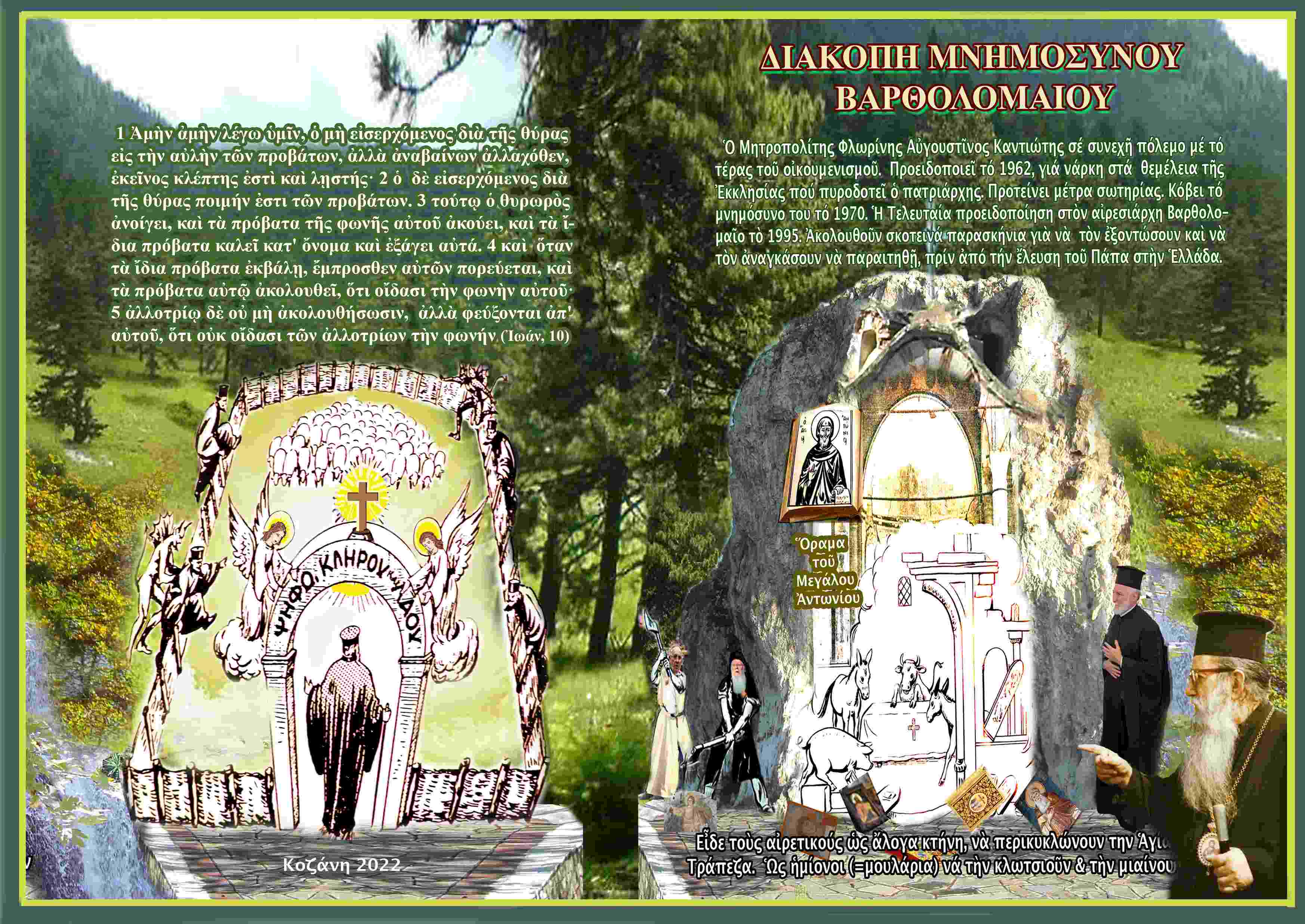
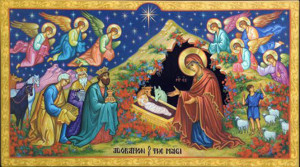
 Be the first!
Be the first! 
